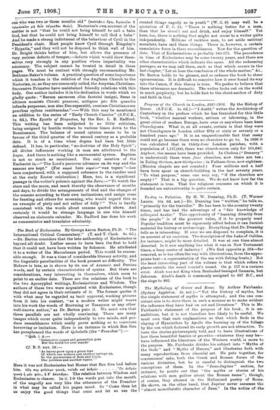The Book of Ecclesiastes. By George Aaron Barton, Ph.D. "The
International Critical Commentary." (T. and T. Clark. 8s. (3d.) —Dr.-Barton considers that the late authorship of Ecclesiastes is beyond all doubt. Luther seems to have been the first to hold that it could not, have been written by Solomon. He attributed it to a writer of the Maccabaean period. This would be reason- able enough. It was a time of considerable literary activity, and the linguistic peculiarities of the book present no difficulty. The Hebrew is late, as is shown by its use of Aramaic and Persian words, and by certain characteristics of syntax. But there are considerations, very interesting in themselves, which seem to point to an earlier date. These are the relations of the book to the two Apocryphal writings, Ecclesiasticus and Wisdom. The authors of these two were acquainted with Ecclesiastes, though they did not agree in their estimate of it. The former quotes it with what may be regarded as tacit approval, working phrases from it into his context, "as a modern writer might weave into his work the words of Browning or Tennyson or any other well-known author," as Dr. Barton puts it. We must own that these parallels are not wholly convincing. There are many images which occur quite independently to two minds, and pro- duce resemblances which really prove nothing as to conscious borrowing or imitation. Here is an instance in which Ben Sira has paraphrased the words of Qoheleth (the " Prea cher ") :—
" Qoh. i. 4 "
' Generation comes and generation goes But the world for ever stands.'
Cf. B. S. xxv. 18 :— ' As leaves grow upon a green tree
Of which one withers and another springs up, So the generations of flesh and blood, One perishes and another ripens.' "
Here it was not Ecclesiastes but Homer that Ben Sim had before
him. oh, amp cpi,A.A.cov ?EMI, Tank Zu4ple's, avapiiiv yeveh hFV 4,41, 7 8' leroxims. The relation between Wisdom and Ecclesiastes is clearer. In ii. 1-9 the words put into the mouth of the ungodly are very like the utterances of the Preacher in what may be called his pagan mood. So "Come then let Its enjoy the good things that exist and let us use the created things eagerly as in youth" (W. ii. 6) may well be a quotation of E. ii. 24, "There is nothing better for a man, than that he should eat and drink, and enjoy himself." Yet here, too, there is nothing that might not occur to a writer quite independently. Millions of reckless men, to set aside satirical moralists, have said these things. There is, however, a certain cumulative force in these resemblances. Now for the question of date. That of Ecclesiaaticus is probably 180-171 The precedence in time of Ecclesiastes may be some twenty years, and there are other characteristics which indicate the same. All the redeeming passages, as we may call them, such as that which occurs in the last chapter, "Let us hear the conclusion of the whole matter," &c., Dr. Barton holds to be glosses, and so reduces the book to sheer epicureanism. It is difficult to conceive how it ever found its way into the Canon, if this theory is true. We prefer to believe that these utterances are dramatic. The writer looks out on the world in much perplexity, but he holds fast to the sheet-anchor of duty and faith in God.






















































 Previous page
Previous page